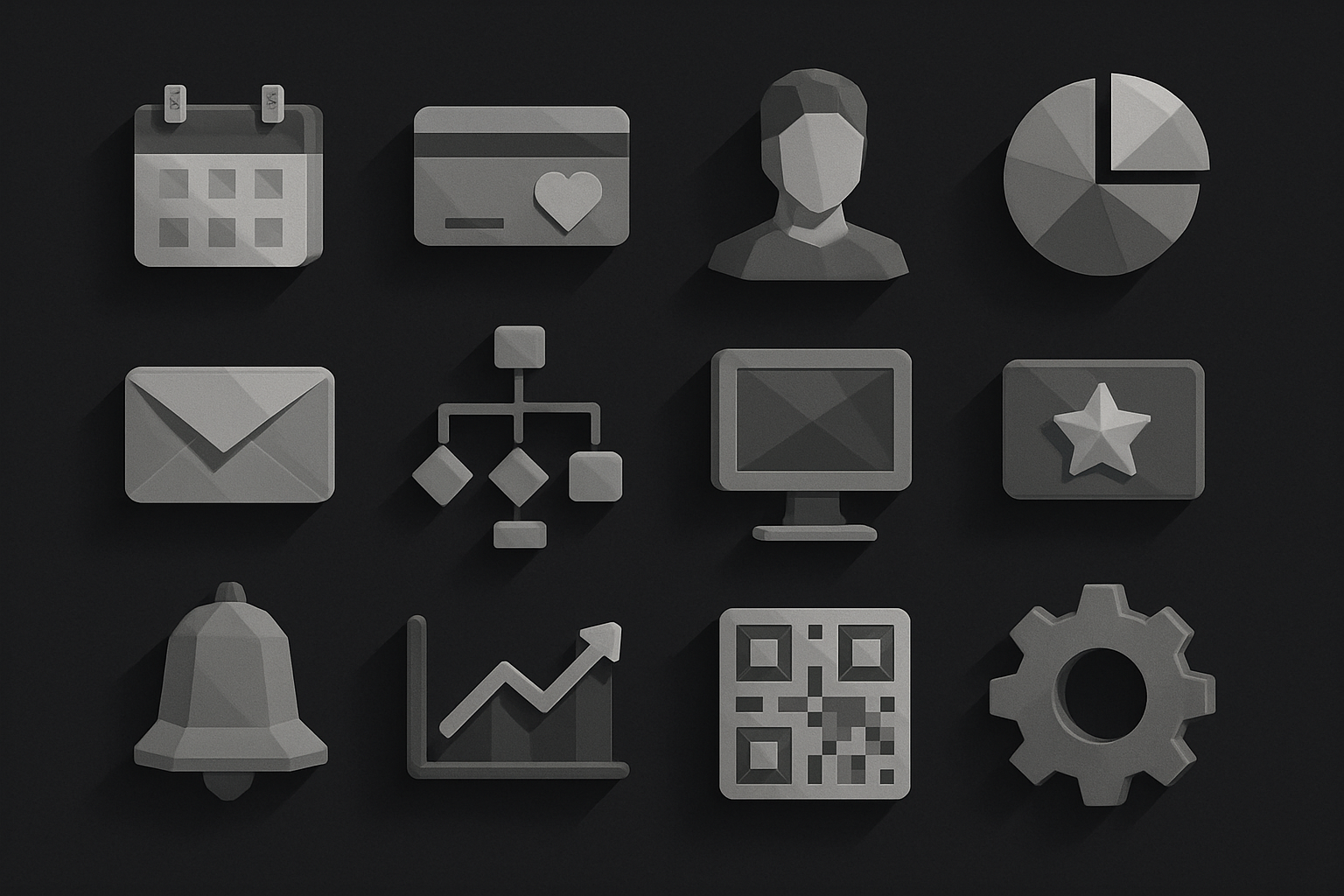Micro SaaS businesses are booming, reshaping the tech landscape with their rapid growth and agility. If you’ve ever dreamed of launching a software venture, 2025 is shaping up to be the year of opportunity.
A micro SaaS is a small, focused, and high-margin software solution that solves specific problems for niche markets. These lean products are built to scale quickly and deliver real value without the overhead of traditional software companies.
In this article, you’ll discover the 12 best micro saas ideas set to thrive in 2025. We’ll break down what makes a micro SaaS successful, explore emerging trends, and share actionable insights to help you turn inspiration into income.
Ready to ride the next wave of digital entrepreneurship? Let’s dive into the strategies and micro saas ideas that can help you build a scalable, profitable business this year.
What is Micro SaaS & Why Does It Matter in 2025?
Micro SaaS ideas are quickly reshaping how entrepreneurs build software businesses. Unlike large SaaS companies with sprawling teams and complex features, micro SaaS focuses on solving very specific problems for niche audiences. These solutions are lightweight, easy to manage, and often run by solo founders or small teams. This simplicity is a big part of their appeal.
Let’s break down how micro SaaS stacks up against traditional SaaS:
| Feature | Micro SaaS | Traditional SaaS |
|---|---|---|
| Team Size | Solo or small team | Large team |
| Product Focus | Narrow, niche problem | Broad, multi-featured |
| Startup Costs | Low | High |
| Time to Market | Fast | Slow |
| Customer Acquisition | Targeted, community-driven | Mass marketing |
| Maintenance | Simple, easy to update | Complex, resource-intensive |
The market for SaaS is booming, with global revenue expected to hit $793 billion by 2029. In fact, the micro SaaS segment alone is projected to reach $59.6 billion by 2030, highlighting just how much opportunity exists for new micro saas ideas. For founders, this means there’s never been a better time to carve out a profitable niche.
Why do micro SaaS ideas matter so much in 2025? For starters, the barriers to entry are low. You don’t need a huge budget or a big engineering team. Thanks to no-code and low-code platforms, even non-technical creators can turn their micro saas ideas into real products quickly. This agility lets you test, iterate, and launch with minimal risk.
Another key advantage is the ability to target hyper-specific audiences. By focusing on a narrow problem, micro SaaS founders can create products that truly resonate. This leads to faster adoption, loyal customers, and more predictable recurring revenue. Many micro SaaS market projections confirm that niche targeting is fueling rapid growth in this space.
Real-world examples bring these micro saas ideas to life. Take the digital punch card app for local bakeries. Instead of paper loyalty cards, customers use their phones to collect rewards. Another example is a Shopify-specific tax calculator that takes the guesswork out of e-commerce sales taxes. These solutions are small in scope but deliver massive value to their users.
Micro SaaS is especially appealing for solopreneurs, freelancers, and creators who want to build scalable, automated income streams. If you have industry expertise or spot an inefficiency in your daily workflow, you might be sitting on the next big micro saas idea.
In summary, micro SaaS ideas combine low risk, high agility, and niche focus into a powerful recipe for success. With the right approach, anyone can launch a high-margin product that generates steady revenue in 2025 and beyond.

12 Best Micro SaaS Ideas to Start in 2025
Ready to discover the most promising micro saas ideas for 2025? Each of these opportunities is designed for fast-moving founders who want to tap into high-margin, recurring revenue streams. We’ll explore the features, benefits, and unique angles that set these micro saas ideas apart, so you can spot the perfect fit for your next project.

1. AI-Powered Social Media Carousel Generator
Social media engagement is evolving, and these micro saas ideas are leading the charge. Imagine a tool that transforms any text into visually stunning carousels for LinkedIn or Instagram—no design skills needed.
- Core features: AI-driven design, layout automation, brand color palettes, drag-and-drop editing.
- Benefits: Saves hours for marketers, boosts engagement, and helps non-designers shine.
- Target audience: Content creators, solopreneurs, agencies.
- Unique selling point: AI automates the tedious parts—just paste your text and watch it come alive.
- Example: Tools like AI Slideshows are trending in digital product circles.
- Pros: Democratizes design.
- Cons: Faces competition from generic design tools.
For anyone looking to launch micro saas ideas in the creator economy, this niche is only getting hotter.
2. Automated Tax Compliance Tool for E-Commerce Stores
Tax headaches are a universal pain for online sellers, making tax-focused micro saas ideas incredibly valuable. This tool integrates directly with Shopify or WooCommerce, automating calculation, filing, and reporting for every jurisdiction.
- Core features: Real-time tax rate syncing, auto-filing, downloadable reports, multi-country support.
- Benefits: Reduces costly errors and frees up time for business owners.
- Target audience: E-commerce sellers, accountants, boutique agencies.
- Unique selling point: Hyper-focused on small operators, offering simplicity over bloat.
- Example: Shopify-specific tax reporting micro SaaS.
- Pros: High retention due to compliance needs.
- Cons: Must keep up with frequent tax law changes.
With micro saas ideas in the compliance space, recurring demand is virtually guaranteed.
3. Digital Loyalty Card & Rewards Platform for Local Businesses
Local businesses crave simple, digital loyalty solutions—making this one of the most practical micro saas ideas in 2025. Replace paper punch cards with a sleek mobile app that tracks rewards and offers actionable analytics.
- Core features: Digital punch cards, customer rewards, POS integration, analytics dashboard.
- Benefits: Drives repeat visits and increases retention.
- Target audience: Cafés, bakeries, salons, small retailers.
- Unique selling point: Plug-and-play integration with existing POS systems.
- Example: Apps like digital punch cards are replacing old-school methods.
- Pros: Low barrier to entry for users.
- Cons: Requires local outreach for adoption.
This is one of those micro saas ideas that turns everyday transactions into long-term loyalty.
4. AI-Based Video Testimonial Generator for Brands
Authentic testimonials move the needle in marketing. Micro saas ideas that automate UGC video creation with AI avatars offer brands a scalable way to build trust.
- Core features: AI avatars, script generation, auto-editing, privacy controls.
- Benefits: Enables brands to publish more testimonials without logistical headaches.
- Target audience: DTC brands, SaaS companies, agencies.
- Unique selling point: Faceless video creation preserves privacy and builds credibility.
- Example: AI UGC tools are gaining traction among marketers.
- Pros: Scalable and fast content creation.
- Cons: Some users may question authenticity.
Among micro saas ideas, this one leverages AI’s storytelling powers for real business impact.
5. Influencer Outreach & Collaboration Tracker
Influencer marketing is booming, but managing campaigns is messy. That’s why micro saas ideas focused on influencer outreach are gaining momentum.
- Core features: Campaign management, outreach tracking, automated follow-ups, analytics.
- Benefits: Streamlines influencer relations and boosts ROI.
- Target audience: Marketing teams, agencies, small brands.
- Unique selling point: Specializes in micro-influencer campaigns, not just the big names.
- Example: Collaboration tools filling gaps left by traditional CRMs.
- Pros: Niche focus offers deeper features.
- Cons: Platforms change quickly, so regular updates are a must.
Micro saas ideas here help brands build lasting partnerships in a crowded space.
6. Automated Customer Feedback Annotation & Insights Tool
Understanding customer feedback is a goldmine for product teams. Micro saas ideas that use NLP to categorize and summarize feedback save hours and reveal actionable insights.
- Core features: Multi-channel feedback import, AI-powered categorization, real-time dashboards.
- Benefits: Instantly highlights trends and pain points.
- Target audience: SaaS founders, product managers, support teams.
- Unique selling point: Designed for small teams needing big insights.
- Example: Tools that annotate feedback for product improvement.
- Pros: Rapid analysis, helps prioritize updates.
- Cons: Needs high-quality data to be effective.
This category of micro saas ideas empowers even the smallest teams to act on user voices.
7. Smart Booking & Workflow Management for Niche Professionals
Niche professionals like photographers or consultants want more than generic tools. Micro saas ideas that blend booking, scheduling, and workflow tracking for specific roles are in demand.
- Core features: Custom booking flows, workflow milestones, automated reminders, client portals.
- Benefits: Reduces no-shows and keeps projects on track.
- Target audience: Freelancers, creatives, boutique agencies.
- Unique selling point: Tailored templates for each niche’s workflow.
- Example: Photographer booking systems with integrated editing timelines.
- Pros: Deep value for each vertical.
- Cons: Market size is limited per niche.
Micro saas ideas like this are proof that specialization leads to loyal customers.
8. SEO Keyword Research Micro SaaS for Local Businesses
SEO can be overwhelming for local shops. Micro saas ideas that simplify keyword research and local SEO give small businesses a fighting chance.
- Core features: Hyper-local keyword suggestions, competitor tracking, on-page recommendations.
- Benefits: Makes SEO accessible to non-experts.
- Target audience: Local service providers, agencies, solo entrepreneurs.
- Unique selling point: Focus solely on local search, not broad national keywords.
- Example: Local SEO assistants built for neighborhood businesses.
- Pros: Easy learning curve.
- Cons: Must keep up with algorithm changes.
For founders, micro saas ideas in local SEO offer a steady market with recurring needs.
9. Applicant Pre-Screening & Skill Assessment Platform
Hiring is a pain point for SMBs. Micro saas ideas that automate applicant testing and video pre-screens help teams hire smarter, faster.
- Core features: Skill test builder, automated video screening, analytics dashboard.
- Benefits: Cuts hiring time and weeds out poor fits early.
- Target audience: Small businesses, recruiters, HR consultants.
- Unique selling point: Intentionally built for SMBs, not bloated for enterprises.
- Example: Screening tools for niche industries.
- Pros: Streamlines recruitment.
- Cons: Needs updated content for new skills.
This is one of the micro saas ideas where automation truly pays off for busy teams.
10. Micro SaaS for Automated Waitlist & Early Access Management
Creating buzz before launch is critical. Micro saas ideas that manage waitlists and early access make product launches smoother.
- Core features: Signup forms, onboarding automation, embeddable widgets, referral tracking.
- Benefits: Validates demand and builds anticipation.
- Target audience: SaaS startups, DTC brands, creators.
- Unique selling point: Lightning-fast setup, easy to integrate.
- Example: Waitlist tools for new app launches.
- Pros: Quick to deploy.
- Cons: Demand can be seasonal.
Many successful micro saas ideas start as waitlist tools—then evolve with their users.
11. Time & Attendance Tracking for Remote Teams
Remote work is here to stay, and micro saas ideas that track time and attendance are in constant demand.
- Core features: Mobile-first logging, attendance verification, exportable payroll reports.
- Benefits: Ensures accountability and simplifies payroll.
- Target audience: Remote startups, agencies, freelancers.
- Unique selling point: Minimal setup, works on any device.
- Example: Mobile time tracking apps for distributed teams.
- Pros: Low-friction onboarding.
- Cons: Must address privacy concerns.
For recurring revenue, micro saas ideas in remote team management are evergreen.
12. Drip Campaign Flowchart & Email Sequence Builder
Email marketing is the lifeblood of many businesses. Micro saas ideas that offer a visual flowchart builder for drip campaigns make automation accessible to everyone.
- Core features: Drag-and-drop sequence builder, pre-built templates, analytics integration.
- Benefits: Saves setup time and increases campaign clarity.
- Target audience: Solopreneurs, marketers, SMBs.
- Unique selling point: Visual approach for non-technical users.
- Example: Drip campaign flowchart tools for small teams.
- Pros: Intuitive and easy to use.
- Cons: Competes with larger platforms.
If you’re looking for more inspiration or want to explore broader opportunities, check out these micro SaaS trends and niche markets for 2025 to see where the next wave of micro saas ideas is headed.
How to Launch and Grow Your Micro SaaS in 2025
Bringing your micro saas ideas to life in 2025 can be both exciting and overwhelming. With the right approach, you’ll move from concept to thriving SaaS business faster than ever. Let’s break down a proven roadmap to help you launch, grow, and scale with confidence.

Step 1: Validate and Prototype Your Idea
Start by validating your micro saas ideas with real users. Identify a pressing pain point, then create a quick MVP (minimum viable product). Use surveys or interviews to confirm demand.
Build a simple prototype—don't over-engineer. Rapid iteration is crucial. Launch your MVP to a small audience and gather actionable feedback before scaling further.
Step 2: Leverage No-Code/Low-Code Tools
Speed is essential when launching micro saas ideas. No-code and low-code platforms let you build, test, and refine products without deep technical skills. These tools drastically cut development time and cost.
Explore no-code tools enabling rapid micro SaaS development to see which platforms best match your skill set and business goals.
Step 3: Integrate with Popular Platforms
Integrations are the lifeblood of successful micro saas ideas. Connect your tool with platforms like Slack, Shopify, or CRMs to boost adoption. Seamless integrations help your product fit naturally into users’ existing workflows.
Prioritize popular tools in your niche and offer embeddable widgets or APIs for easy setup.
Step 4: Build Your First User Base
Attracting early users is key for validating and improving your micro saas ideas. Start with a small beta launch to gather feedback and testimonials.
Engage in niche communities, forums, or social media groups where your target users hang out. Partner with micro-influencers to reach a broader audience.
Step 5: Monetize and Measure What Matters
Choose a monetization model that fits your market—subscriptions, freemium, or micro-transactions are popular for micro saas ideas.
Track these essential metrics to ensure healthy growth:
| Metric | Why It Matters |
|---|---|
| Churn Rate | Measures customer retention |
| MRR (Monthly Recurring Revenue) | Tracks predictable revenue growth |
| Activation Rate | Shows how many users become active customers |
| Feedback Loops | Drives continuous product improvement |
Step 6: Scale and Automate for Growth
As your micro saas ideas gain traction, consider when to expand features, enter adjacent niches, or automate support. Case studies show that solopreneurs often start with a narrow focus, then scale by listening to users and automating repetitive tasks.
For a deeper dive into launch strategies, check out how to launch a product online.
Launching and growing micro saas ideas in 2025 is about moving fast, listening to users, and leveraging the right tools. Take action today and turn your concept into a profitable SaaS venture.
Now that you’ve got a taste of the most promising micro SaaS ideas for 2025, it’s the perfect time to take the next step toward building your own digital product business. Whether you’re excited by the power of automation, eager to tap into niche markets, or just ready to break out of the time-for-money grind, you don’t have to do it alone. We’ve put together a handpicked collection of actionable micro SaaS ideas—plus insights on what makes them work—so you can start turning your inspiration into reality. Ready to see what’s possible? View Product Ideas